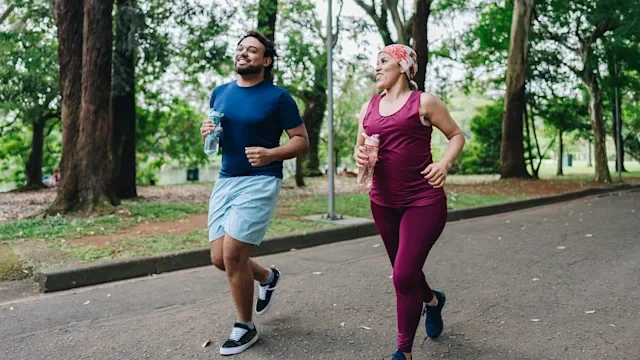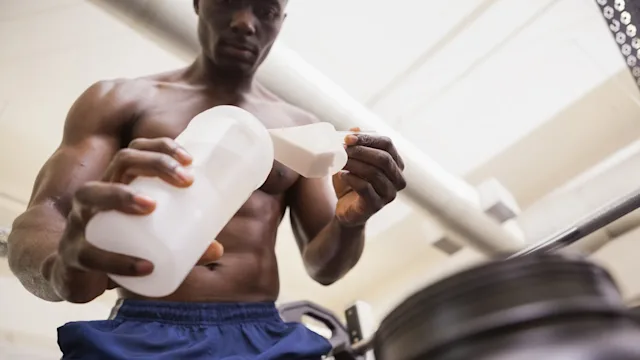Key takeaways:
Frequent, intense exercise without adequate rest between workouts increases your risk of overtraining syndrome.
This condition can have a significant ripple effect. It may result in lower athletic performance, injuries, disrupted sleep, and even depression.
Taking a rest day doesn't mean skipping all physical activity. Instead, you can explore movement that's fun and not performance-related.
Consistent, effective workouts are critical to achieving your fitness goals. That's true whether you want to build muscle, increase endurance, or run a marathon. But it’s also important to get adequate rest, so that you don’t risk overtraining. Overtraining syndrome is more than occasional burnout. It’s a medical condition that can impair your exercise performance. And it comes with symptoms like fatigue that make it difficult to bounce back.
"If you push yourself even though you're showing signs of overtraining, it can have serious health consequences," says certified strength and conditioning coach Garret Seacat. "The longer this goes on, the more time you'll need for your body to recover properly." Knowing the signs that your body needs a rest can help you stay on track and avoid overtraining.
What is overtraining syndrome?
Overtraining syndrome occurs when you do intense or frequent exercise without proper rest between workouts. It can cause fatigue, muscle pain, and other symptoms that hurt your performance and overall health. Overtraining is common among elite athletes, and particularly those in endurance sports like running and swimming. But you can develop overtraining syndrome doing any type of exercise.
Search and compare options
Rest is an important part of any fitness regimen. It allows your muscles to repair and recover from the stress of your workouts, says Seacat. On rest days, your body also changes in ways that help it adapt to your training. This process is essential for building muscle and making fitness gains. But the benefits of rest don't end with your muscles.
Before you reach the point of overtraining, you'll likely experience overreaching. This can happen when you do too much strenuous exercise in a short period of time. You'll notice increased muscle soreness and decreased exercise performance when you overreach. "Consider this a wakeup call that your body needs rest," says Seacat. Luckily, if you take time to properly recover, the symptoms of overreaching should improve within several days. However, ignoring early signs of overreach and continuing to push yourself can trigger overtraining syndrome, which often has worse symptoms and lasts longer.
Signs and symptoms of overtraining syndrome
Overtraining can affect your physical and mental health. Fatigue and low motivation are two of the biggest signs of overtraining syndrome, according to Joshua Norman, DO. Norman is an assistant professor of psychiatry and behavioral health at The Ohio State University Wexner Medical Center and specializes in sports psychiatry.
"You'll usually experience mood changes first," says Norman. These changes can include irritability and indifference. You might find yourself dreading the workouts you usually enjoy. Or you might get annoyed in the middle of your favorite exercise. Norman explains that there are a number of symptoms that can be signs of overtraining, including:
Prolonged general fatigue
Muscle or joint pain
Lower training capacity or exercise performance
Slower recovery from exercise
More frequent injury or illness
Low energy
Losing motivation to workout
Lack of enjoyment from other activities that were once enjoyable
Moodiness, anger, anxiety, or depression
Decreased appetite or weight loss
Higher resting heart rate
Trouble concentrating
Insomnia or poor sleep quality
Recognizing the signs of overtraining often comes down to understanding what's normal for you. Maybe you tend to have sore muscles for a day after lifting weights, but you’ve noticed that it now takes 3 or 4 days to recover. Or perhaps you've started getting headaches after high-intensity workouts. "Generally, you feel like something is off or wrong," says Norman. "And the more you try to power through it, the worse your symptoms become."
Read more like this
Explore these related articles, suggested for readers like you.
How do you treat overtraining syndrome?
Treatment for overtraining depends on several factors, including how long you've been grinding without rest and the severity of your symptoms. "Generally, treatment involves taking a complete break from training for at least a couple of weeks," says Norman. If your symptoms are severe, you may need a longer rest period.
While taking a break from exercise, it can be a good time to focus on your well-being. You can assess your eating habits and think about the best way to fuel your workouts. It can also be helpful to spend time practicing stress management techniques for your mental health. You don't have to skip exercise altogether, adds Seacat. But focus on fun activities that help you relieve stress, rather than doing performance-based workouts. Leisurely bike rides, rock climbing, yoga, or dancing might be good options. Any activity that requires you to move your body without tracking your progress or pushing yourself too hard can help.
"Often, this break will act as a refresh and reset for athletes," says Norman. "We'll see their appetite return, sleep quality get better, and overall outlook improve. That's how you know it was overtraining and not some other health condition."
When you are ready to return to training, ease into it. You might start by working out only half as much as you did before your break, and gradually increase from there. Not doing too much too soon is important even if all of your symptoms have subsided. Norman says that a gradual return can help prevent a recurrence of overtraining.
Can you prevent overtraining syndrome?
Yes. And, like any medical condition, prevention is better than treatment. To balance your rest days with your training days, consider these strategies:
Cross train: With cross training, you can include various types of exercise in your fitness routine by rotating between aerobics, strength training, and flexibility exercises. This approach helps you get full-body workouts while not overworking particular muscle groups.
Make time for recovery: Include 2 or 3 rest days in your weekly training schedule.
Practice active recovery: Active recovery involves doing low-intensity exercise to help your body bounce back from strenuous training. You can try activities like walking, swimming, or tai chi on your rest days.
Listen to your body: Always pay attention to the signals your body gives you. Notice how your workouts affect you physically and emotionally. Staying aware will help you know when something doesn't feel right.
Maintain a healthy diet: Proper nutrition helps you prepare for exercise and recover afterward.
Get a good night's sleep: Maintain good sleep hygiene with practices like having a regular bedtime routine. Doing so can help you get more restful sleep.
Finally, make sure you don't skip social time with friends and family, says Norman. It's easy to become overly focused on your fitness goals, especially while preparing for a competition. But doing so can increase your risk of overtraining. So try not to let your training consume you.
The bottom line
Not getting adequate rest between workouts can lead to overtraining syndrome. Symptoms like fatigue, pain, and moodiness may derail your training and take a toll on your general well-being. That's why rest days are just as crucial as training days. Rest helps you recover from strenuous workouts, achieve fitness goals, and avoid overtraining syndrome.

Why trust our experts?



References
American Academy of Orthopaedic Surgeons. (2020). Cross training.
Egan, B., et al. (2013). Exercise metabolism and the molecular regulation of skeletal muscle adaptation. Cell Metabolism.
Kreher, J. (2016). Diagnosis and prevention of overtraining syndrome: An opinion on education strategies. Open Access Journal of Sports Medicine.
Krzysztofik, M., et al. (2019). Maximizing muscle hypertrophy: A systematic review of advanced resistance training techniques and methods. International Journal of Environmental Research and Public Health.
Ma, Y. (2011). Preventative and therapeutic treatment of injuries in selected sports. Acupuncture for Sports and Trauma Rehabilitation.
Monteiro, E. R., et al. (2019). Effects of different between test rest intervals in reproducibility of the 10-repetition maximum load test: A pilot study with recreationally resistance trained men. International Journal of Exercise Science.
Nathan, C. (2015). Overtraining syndrome. Current Sports Medicine.
Tobar, D. A. (2009). Trait anxiety and mood state responses to overtraining in men and women college swimmers. International Journal of Sport and Exercise Psychology.

















